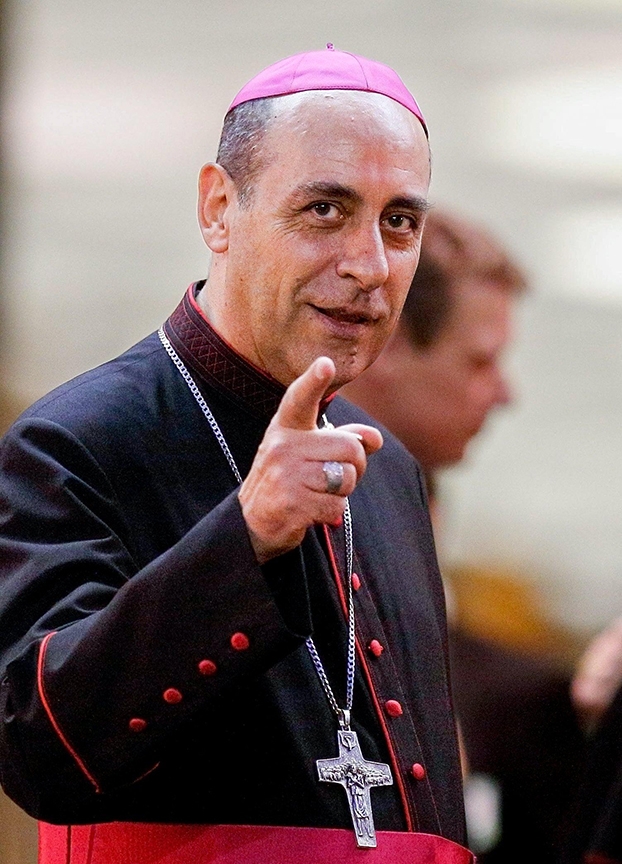
VATICAN CITY. The Catholic Church must take great care to avoid rites or blessings that suggest marriage is anything other than a sacramental bond between one man and one woman, the incoming prefect of the Vatican’s doctrinal office said.
“There is nothing that can compare to (marriage) and using that name to express something else is not good nor correct,” said Archbishop Víctor Manuel Fernández of La Plata, Argentina, in an interview with InfoVaticana, a Spain-based news website covering the Catholic Church, published July 5.
“That is why I think that the greatest care must be taken in avoiding rites or blessings that could feed that confusion. Now, if a blessing is given in such a way that it does not create that confusion, it will need to be analyzed and confirmed,” he added.
While homosexual men and women must be respected, any form of blessing a same-sex union is “illicit,” the Vatican Congregation for the Doctrine of the Faith said in a document issued in 2021.
The negative judgment is on the blessing of unions, not the people who may still receive a blessing as individuals “who manifest the will to live in fidelity to the revealed plans of God as proposed by Church teaching,” it said in a statement.
“It is not licit to impart a blessing on relationships, or partnerships, even stable, that involve sexual activity outside of marriage – i.e., outside the indissoluble union of a man and a woman open in itself to the transmission of life – as is the case of the unions between persons of the same sex,” the doctrinal office said in an explanatory note accompanying the statement. Pope Francis approved both the statement and the note for publication.
Pope Francis appointed Archbishop Fernández to be prefect of the Vatican’s influential Dicastery for the Doctrine of the Faith July 1. The Argentinean theologian, a biblical specialist, was elected president of the doctrine commission of Argentina’s bishops’ conference in 2017 and since 2018 has been archbishop of La Plata, home to an estimated 630,000 Catholics.
In the July 5 interview, the archbishop revealed that he initially turned down his nomination as prefect because “I did not consider myself adequate to lead the work in the area of discipline,” particularly regarding the dicastery’s work in handling accusations of the abuse of minors.
However, he said, Pope Francis then asked that he delegate investigations into abuse allegations brought against members of the clergy to the dicastery’s discipline section created in 2021. “It is complex because in principle one has to believe those who present accusations of child abuse, one has to believe them, and on the other hand one cannot condemn the priest without due process, which requires time,” he said.
In another interview published July 6 with Javier Martínez-Brocal, Vatican correspondent for the Spanish newspaper ABC, the archbishop said he would let the discipline section “work with autonomy, similar to what happens with the (Pontifical) Commission for the Protection of Minors, which is led by (Boston) Cardinal O’Malley and where the prefect has little involvement.”
Archbishop Fernández also responded to criticism by some Catholics regarding his nomination , saying that he is neither a conservative nor liberal but doesn’t want to be labeled “an extreme centrist.” He cited his strong opposition to abortion that made headlines during campaigns in Argentina to legalize abortion as well as his love for the Church’s social doctrine; he said he wants to respond to the pope’s invitation to “be very attentive to people’s conditions, to not make people suffer with our judgements set in stone.”
He called this blend of theological principles “evangelical coherence,” which entails “defending life in all circumstances, for the unborn child just as for the one who is raised in misery and abandoned by society.”
“It is also (having) the tenderness of a brother” which understands that rules are not one-size-fits-all when it comes to the lives of individuals, he told the Spanish newspaper ABC. “Probably that is why they attack me as much from the right as from the left.”
The archbishop also noted that the temptation of falling into a polarized extreme is increasing both within the Church and larger society.
“Christ told us that we need to be in the world, to its depths, but without being of the world,” the archbishop said. “We need to ‘be’ more and show something different, but we get infected (with polarization) and lose the freshness of the Gospel, we don’t exhibit anything truly overarching.”
“Faith is polarized just as society is,” he said.
While Archbishop Fernández clearly stated that “doctrine does not change,” he said that the dicastery will operate differently under his leadership than in the past, focusing more on fostering conversation and promoting theological knowledge rather than “persecuting” or “condemning.”
In the particular details of people’s everyday lives, “it is difficult to throw doctrine down like stones,” he said. “This conviction of mine will probably give another color to the dicastery, but that is inevitable if you realize I am the first Latin American to hold this role.”









